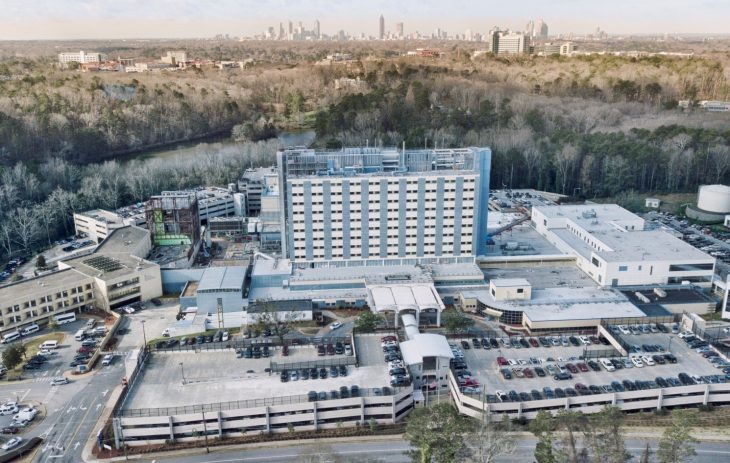About Joseph Maxwell Cleland Atlanta VA Medical Center
The Joseph Maxwell Cleland Atlanta VA Medical Center is a cornerstone of veterans’ healthcare in Atlanta. This location is in Decatur, Georgia, and it’s a comprehensive hospital with numerous departments and specialties. One of those departments is their mental health and substance use treatment center where they have detox.
When you’re detoxing at this VA center, you can expect thorough and personalized treatment. Their level of care is medically managed detox which means you’ll have medical professionals around the clock who will monitor your health and safety during your withdrawals.
Depending on what drugs or alcohol you’re withdrawing from and other factors they might also be able to give you medications like methadone or Suboxone or naltrexone. These medications help your body to transition away from those substances and relearn how to function without them.
The fact that this is a VA hospital is a great benefit as long as you meet the criteria of being a veteran or military service member or family member. They specialize in treating veterans and service members here so they’re experts in treating addiction alongside issues like PTSD or the challenges of returning home. You also have the expansive VA network at your fingertips so after detox they can transition you into the next step in your recovery journey whether that’s residential rehab or outpatient addiction treatment.
They’re also pretty close to downtown Atlanta, which means you’ll have plenty of ways to get to the facility. They have limited transportation available that can pick you up and drop you off so you won’t miss a single appointment.
Unfortunately the client reviews for this hospital aren’t very good. Clients have frustrations about long wait times and several of them say that they felt like the providers cut corners and didn’t address their concerns. To be fair, this is a large hospital and each department has its own challenges and most of the bad reviews were about the emergency room here rather than the detox unit.
Levels of Care
-
PHP
Partial hospitalization programs provide comprehensive treatment in a structured setting during the day but allow you to return home at night. These programs offer a balance of inpatient and outpatient rehab and provide intensive support without full time residency.
-
Outpatient
In outpatient therapy, you’ll attend therapy sessions several times each week while living at home. This is ideal if you have a strong support system and a lower risk of relapse. Outpatient treatment offers flexibility to maintain work, school or family obligations.
-
Aftercare
Aftercare programs provide ongoing support after you complete a rehab program. They may include several components to help you maintain sobriety including therapy, community support groups and relapse prevention strategies. This gives you a network of resources as you reintegrate into your daily life.
-
Dual Diagnosis
Dual diagnosis programs address substance use disorders and co-occurring mental health conditions simultaneously. This integrated approach to care improves the likelihood of long term recovery and stability by addressing the root causes of addiction.
-
Sober Living
Sober living homes provide a supportive and substance free environment for you to live in as you overcome your addiction. Residents must follow house rules and support each other's recovery journeys. Sober living fosters accountability and stability during this critical phase of recovery.
Detox Service Setting
-
Outpatient Detox
Outpatient detox gives you access to medically supervised withdrawal services while still allowing you to live at home. You’ll attend a clinic for treatment and monitoring. This flexible option is suitable for those with mild to moderate withdrawal symptoms who have strong support systems.
-
MAT
Medication assisted treatment combines medication and counseling to manage withdrawal and reduce cravings for opioid and alcohol addiction. Medications may include methadone, buprenorphine or naltrexone. MAT is tailored to your needs so you can actively participate in your treatment journey.
Programs
-
Adult (18+)
Adult programs address the substance use and life challenges specific to adults. Therapists can deliver sessions in individual, group and family settings. Services often include job support and life skills training in a structured environment.
-
Alcohol Detox
Alcohol detox programs offer medical support to help individuals withdraw safely from alcohol. Your care team may use medications to ease your symptoms and provide medical monitoring to address complications.
-
Cognitive Behavioral Therapy
Cognitive behavioral therapy focuses on changing harmful thought patterns and behaviors associated with addiction. You’ll learn healthier coping mechanisms by identifying and replacing negative thoughts. This improves your emotional resilience and decreases your relapse potential.
-
LGBTQ Friendly
LGBTQ friendly programs create an inclusive and affirming space for recovery. Treatment is sensitive to issues like discrimination and stigma. You’ll receive support and therapy that respects and acknowledges your unique experiences.
-
Men
Men's programs address substance use while also considering the social pressures, family roles and mental health concerns that are specific to men. You’ll learn healthy coping mechanisms as you build emotional resilience and develop communication skills.
-
Military / Veterans
Military and veteran programs offer specialized support for clients who served in the armed services. Programs focus on reintegration and healing within a structured and supportive environment that acknowledges the unique struggles of military life.
-
Opioid Detox
Opioid detox uses medications to ease severe withdrawal symptoms. It also includes medical supervision to help you manage potential complications. These services allow you to stabilize and begin a recovery plan.
-
Seniors (65+)
Senior programs address the unique needs of older adults like chronic pain, grief and isolation. Programs include peer support and medical oversight for age related health concerns. The goal is to improve quality of life and promote sober aging.
-
Women
Women's programs offer a safe and supportive space to focus on gender specific issues such as trauma, family roles and mental health conditions. Therapists tailor the sessions to address women's needs and foster empowerment in a healing and nurturing environment.
-
Young Adult (18 - 25)
Young adult programs are designed for individuals who are transitioning into adulthood. Topics of discussion typically include identity, independence and peer relationships. Providers may also offer life skills training and career support.
Payment Options
- Payment Assistance
- Military Insurance
- Private Insurance
- Self Pay
Accreditations
-
 SAMHSA
SAMHSA
-
 Joint Commission
Joint Commission
-
 CARF
CARF
Amenities
- Lakeside
- Private Transportation
Contact
1670 Clairmont Road
Decatur, GA 30033





